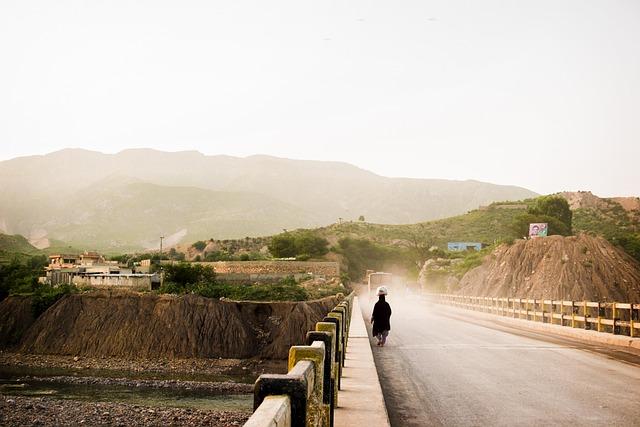In the heart of South Asia lies Pakistan, a nation steeped in rich history and vibrant culture, yet shadowed by an enduring struggle against the specter of terrorism. For decades, this complex landscape has been marred by violence and strife, challenging not only the safety of its citizens but also the very fabric of its society. “Unveiling the Shadows: Pakistan’s Ongoing Battle Against Terrorism” delves into the multifaceted nature of this conflict—a conflict that intertwines political struggles, ideological divides, and socio-economic dilemmas. As we peel back the layers of this intricate tapestry, we seek to understand the roots of extremism, the measures taken to combat it, and the resilient spirit of a nation determined to reclaim its narrative. Join us as we explore the delicate dance between security and freedom, hope and despair, in a land where the shadows of the past continue to shape the future.
Understanding the Historical Context of Terrorism in Pakistan
The historical landscape of terrorism in Pakistan is deeply intertwined with a range of geopolitical and socio-economic factors. Rooted in the complex legacy of the partition in 1947, the subsequent Indo-Pak wars, and the Cold War dynamics, the nation has faced a myriad of challenges that have paved the way for extremist ideologies. Notably, the Soviet invasion of Afghanistan in 1979 played a pivotal role, prompting a surge in militancy that not only transformed Afghanistan but also spilled over into Pakistan. Over the decades, various militant groups have proliferated, each with distinct objectives, yet often sharing common threads of frustration with socio-political issues such as poverty, unemployment, and lack of education.
Moreover, the government’s strategic decisions during the late 20th century inadvertently fostered an environment ripe for extremism. The state-led policies of empowerment and funding for certain factions during military regimes have significantly contributed to the current security crisis. As a consequence, an array of domestic and international actors now influences the situation, leading to a multifaceted conflict characterized by shifting alliances and emerging factions. This historical context reveals that combating terrorism in Pakistan is not solely a matter of military might, but also requires a deep understanding of the underlying social grievances and geopolitical realities that continue to fuel violent extremism.

Identifying Key Players and Their Motivations
In the complex landscape of Pakistan’s fight against terrorism, understanding the key players is crucial. These entities range from state actors, such as the military and intelligence agencies, to non-state actors like militant groups and ideological organizations. The motivations behind each player’s involvement can vary significantly: for the military, the imperative often lies in national security and maintaining territorial integrity; for militant groups, motivations can be rooted in ideological commitment, grievances against the state, or even external support.
Analyzing the motivations of these key players can be simplified into several categories:
| Key Player | Primary Motivation |
|---|---|
| Military | National security and stability |
| Intelligence Agencies | Preemptive threat neutralization |
| Militant Groups | Ideological warfare and territorial ambitions |
| Political Leaders | Power consolidation |
Meanwhile, external factors such as regional geopolitics and foreign interventions further complicate this dynamic, often swaying the motivations of these players in unpredictable directions. For instance, the presence of foreign militant networks can amplify local grievances, while international diplomatic efforts may seek to stabilize the situation but can also inadvertently empower radical narratives. Understanding this interplay is essential for crafting effective strategies in combatting terrorism in Pakistan.

Strategies for Strengthening National Security and Community Resilience
To effectively combat the multifaceted threat of terrorism, it is paramount that national security strategies prioritize a holistic approach. This necessitates the collaboration of various sectors, including governmental bodies, law enforcement, and civil society organizations. Initiatives may encompass:
- Community Engagement: Fostering relationships with local communities to build trust and gather vital intelligence.
- Education and Awareness: Promoting awareness programs to counter radicalization, particularly among youth.
- Capacity Building: Enhancing the skills of law enforcement and security forces through specialized training and resources.
Additionally, technology plays a critical role in strengthening security frameworks. By leveraging data analytics and AI, security agencies can enhance surveillance capabilities and improve responsiveness to emerging threats. Implementing robust cyber-security measures is also essential to protect sensitive information from terrorist organizations. Below is a comparative table showcasing the components of a resilient security framework:
| Component | Description | Impact on Security |
|---|---|---|
| Community Policing | Involvement of local communities in policing efforts. | Strengthens trust and increases information flow. |
| Cybersecurity | Protection of data from cyber threats. | Safeguards critical infrastructures against attacks. |
| Intelligence Sharing | Collaboration between agencies for information exchange. | Enhances threat detection and prevention. |

Fostering International Cooperation in the Fight Against Extremism
In today’s interconnected world, the complexities of terrorism and extremism transcend borders, demanding a united response from nations worldwide. Pakistan, grappling with its unique challenges, recognizes that addressing this menace requires an integrated approach involving international partnerships. Collaborative efforts can lead to improved intelligence sharing, joint operations, and comprehensive counter-narratives that undermine extremist ideologies. By engaging with global partners, Pakistan can fortify its strategies, making them more robust and adaptable to the evolving tactics employed by terrorist organizations.
Building alliances with countries facing similar threats is crucial in the fight against extremism. Key areas of focus include:
- Intelligence Sharing: Developing secure communication channels to facilitate real-time information exchange.
- Joint Training Programs: Conducting cooperative drills and workshops to enhance operational preparedness.
- Community Engagement: Promoting initiatives that encourage dialogue between different cultures, thereby reducing the social divides that extremists exploit.
Furthermore, regional forums play a vital role in fostering dialogue and collaboration among countries. A collaborative framework might include:
| Country | Focus Area | Potential Collaboration |
|---|---|---|
| Afghanistan | Border Security | Patrol Coordination |
| India | Counter-Radicalization | Exchange Programs |
| Saudi Arabia | Funding Tracking | Joint Investigations |
By channeling resources and expertise into these interconnected initiatives, Pakistan can enhance its resilience against extremism while contributing to a more stable global landscape.
In Retrospect
As the sun sets on the complex terrain of Pakistan’s relentless struggle against terrorism, it becomes evident that this battle is not merely a series of skirmishes, but rather an intricate tapestry woven with threads of resilience, sacrifice, and hope. While the specter of violence may cast its shadow, the spirit of a nation persists in its fight for peace and stability.
Pakistan’s ongoing narrative is one of relentless endeavor; communities band together, security forces adapt, and the socio-political landscape evolves in response to the ever-changing challenges posed by extremist elements. The road ahead may be fraught with obstacles, but the concerted efforts of its people and leadership forge a path illuminated by the promise of a safer future.
As we step back from the shadows, we recognize that understanding the multifaceted nature of terrorism in Pakistan is crucial not only for the nation itself but also for global stability. In sharing this story, we are reminded that the fight against extremism is a shared responsibility, requiring collaboration, empathy, and a commitment to addressing the root causes that breed violence.
the story of Pakistan is still being written. Each chapter is marked by the resilience of its people and the lessons learned along the way. The journey may be long and arduous, but the collective aspiration for peace and unity will continue to rise, gradually dispelling the shadows that have long lingered.



